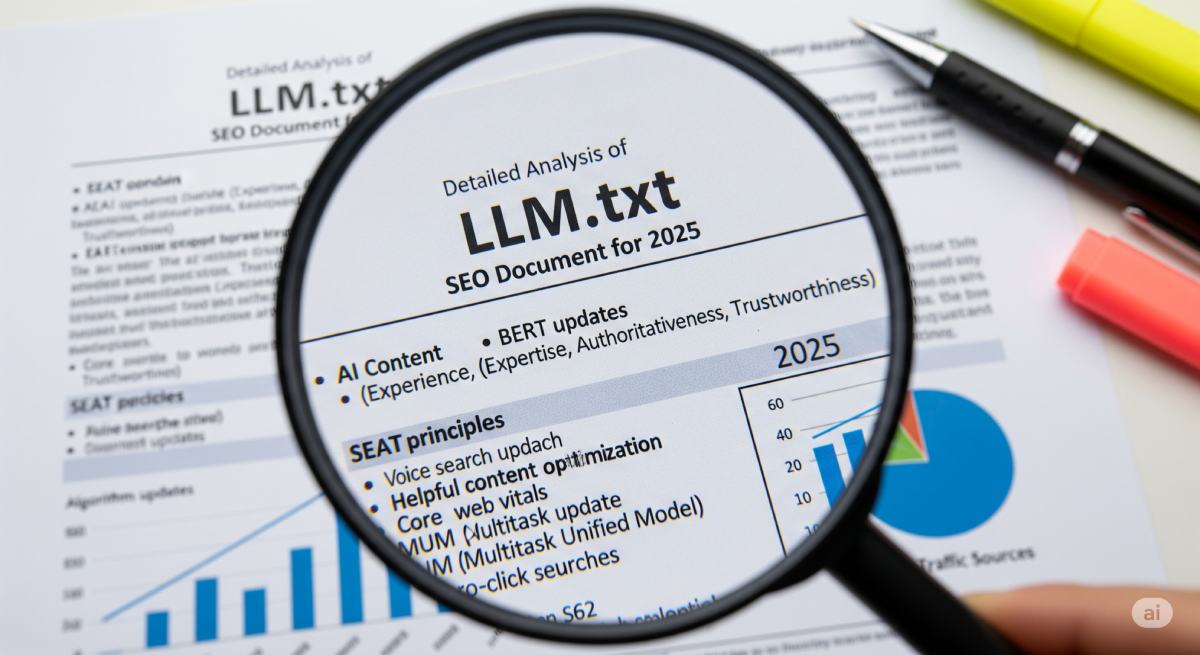You’ve undoubtedly heard rumors about LLM.txt files circulating in digital marketing circles if you’ve been keeping up with the most recent SEO trends. While some experts dismiss it as nothing more than digital snake oil, others are referring to it as the “next big thing” for AI search optimization. What is the truth about SEO and LLM.txt, then?
The short answer is that the LLM.txt is somewhere in the fuzzy middle and may surprise you with the fact that it is neither an SEO magic bullet nor utterly worthless. Let’s investigate closely what this enigmatic file does, why John Mueller of Google likened it to out-of-date meta keywords, and if you should invest your valuable time in putting it into execution.
What is LLM.txt and Why Should SEOs Care?
LLM.txt (Large Language Model text) is a proposed standard file that websites can use to communicate directly with AI systems and language models about their content. Think of it as a curated menu for AI crawlers—instead of letting them feast randomly on your entire website buffet, you’re essentially saying, “Hey, try the chef’s special recommendations.”
The concept emerged as AI-powered search engines like ChatGPT, Perplexity, and Google’s AI Overviews began reshaping how people find information online. Unlike traditional robots.txt files that tell crawlers what NOT to access, LLM.txt files guide AI systems toward your most valuable, AI-digestible content.
But here’s where things get interesting (and controversial): while the concept sounds logical, the real-world SEO impact is far more nuanced than most guides would have you believe.
The Google Reality Check: What John Mueller Really Said About LLM.txt SEO
Let’s address the elephant in the room. Google’s John Mueller recently made headlines by comparing LLM.txt files to keyword meta tags—and if you’ve been in SEO long enough, you know that’s not exactly a compliment. Keyword meta tags became obsolete years ago because they were easily manipulated and provided little value to users.
Mueller’s comparison suggests that Google views LLM.txt with similar skepticism. More importantly, Google has explicitly stated they won’t be crawling LLM.txt files for their AI Overviews feature. Instead, they recommend focusing on traditional SEO best practices.
The SEO community has been rocked by this discovery. What will happen to LLM.txt’s SEO value if Google, the search engine behemoth that handles over 8.5 billion queries every day, doesn’t intend to use it?

The Hidden SEO Benefits of LLM.txt (That Nobody Talks About)
Despite Google’s lukewarm response, dismissing LLM.txt entirely would be shortsighted. Here’s why savvy SEOs might still want to pay attention:
Diversity of AI Search Engines
Although Google still leads traditional search, Perplexity, ChatGPT’s web browsing, and Claude are becoming more popular AI-powered platforms. These platforms might adhere to LLM.txt guidelines, which could give you a leg up in AI-generated responses.
Benefits of Content Organization
Producing an LLM.txt file compels you to consider your most crucial content carefully. By itself, this practice can enhance your internal linking structure and content strategy, both of which are advantageous for conventional SEO.
Future-Proofing Strategy
The field of AI search is changing quickly. Despite Google’s current disregard for LLM.txt, search trends and technological advancements could drastically alter in the years to come. Adoption early on could put you in more advantageous circumstances for changes later on.
Brand Protection
By ensuring AI systems access your official, high-quality content instead of scraping possibly erroneous or out-of-date third-party data concerning your brand, LLM.txt files can help safeguard your brand.
The Dark Side: Why LLM.txt Might Actually Hurt Your SEO
Now for the reality check that most LLM.txt evangelists won’t tell you about. Implementing this strategy isn’t without risks.
Resource Misallocation
Time spent creating and maintaining LLM.txt files is time not spent on proven SEO tactics like content creation, link building, or technical optimizations. For most websites, traditional SEO activities will deliver better ROI.
False Security
Through the use of LLM.txt, some website owners could think that their web pages are “optimized for AI search,” possibly ignoring superior SEO techniques. It’s the digital equivalent of moving the Titanic’s deck chairs.
Inconsistent Implementation
In the absence of created best practices, poorly killed LLM.txt files may cause AI systems to become confused or, worse, may draw attention to subpar content that harms your online reputation.
Limited Measurability
Unlike traditional SEO efforts, tracking the impact of LLM.txt on your search performance is extremely difficult. How do you measure success when the metrics are largely invisible?
LLM.txt vs Robots.txt: Understanding the Critical Differences
Many SEOs mistakenly think LLM.txt is just “robots.txt for AI,” but that’s like saying a smartphone is just a phone that texts. The differences are fundamental:
Robots.txt files use exclusionary logic—they tell crawlers what to avoid. LLM.txt uses inclusionary logic—it highlights what AI systems should prioritize. While robots.txt has been universally adopted and respected by search engines for decades, LLM.txt is still in its experimental infancy.
Moreover, robots.txt directly impacts your search visibility by controlling crawler access. LLM.txt, on the other hand, offers suggestions that AI systems may or may not follow, making its impact far less predictable.
Real-World Case Studies: Who’s Actually Using LLM.txt and What Results They’re Seeing
Early adopters involve tech-forward businesses and AI startups, who mainly use LLM.txt for brand regulation and content curation rather than for SEO benefits. Early implementers seem to agree on cautious optimism—it’s not revolutionary, but it’s further not harmful.
That so many traditional SEO agencies haven’t given LLM.txt implementation a top priority for their clients is especially telling, indicating that the ROI debate isn’t yet sufficiently powerful to upend established workflows.data remains scarce.
What’s particularly telling is that many traditional SEO agencies haven’t prioritized LLM.txt implementation for their clients, suggesting the ROI case isn’t compelling enough yet to disrupt established workflows.
How to Implement LLM.txt for SEO (If You Decide It’s Worth It)
If you’ve decided to experiment with LLM.txt despite the mixed signals, here’s how to do it strategically:
Find which for your content pieces are the most valuable and comprehensive first. Give careful consideration to content that already does well in traditional search, authoritative guides, and evergreen resources. Steer clear of thin, old, or superfluous content as these could confuse AI systems.
Plan your LLM.txt file so that the most important pages are highlighted first, then the material that supports them. Deliver concise, evocative summaries so AI systems will understand both the importance and context of each article.
Remember: LLM.txt should complement, not replace, your existing SEO strategy. Think of it as an additional signal rather than a primary optimization technique.
The Future of LLM.txt in Search Engine Optimization
Predicting the future of any SEO technique is notoriously difficult, but several trends suggest LLM.txt will remain a niche tool rather than becoming mainstream:
Google’s clear stance against using LLM.txt for AI Overviews significantly limits its immediate SEO impact. However, the broader AI search ecosystem is still developing, and non-Google AI platforms might embrace these standards more enthusiastically.
The key will be monitoring adoption among major AI systems and measuring actual performance impacts rather than relying on theoretical benefits.
Expert Verdict: Should You Implement LLM.txt for SEO in 2025?
Here are my truthful assessments adhering to an exhaustive examination of all the data:
For the majority of websites, LLM.txt is currently a “nice to have” rather than a “must have.”
Experimenting with LLM.txt may offer slight advantages and future-proofing benefits if you’re directing a sizable, resource-filled website with a committed technical staff. Your time and effort would be better spent on tried-and-true SEO principles, though, if you are a company with limited resources, as most businesses are.
For most web pages in the year 2025, the risk-reward ratio just does not support the use of LLM.txt. Focusing on following an emerging SEO fad, prioritize producing top-notch content, establishing trustworthy backlinks, boosting user experience, and continuing to achieve technical excellence.
Conclusion: LLM.txt SEO Strategy Moving Forward
LLM.txt represents an interesting experiment in AI-human communication, but it’s not the SEO game-changer some advocates claim it to be. Google’s dismissive stance, combined with limited measurable benefits and opportunity costs, makes it a low-priority optimization for most websites.
Nevertheless, the field of AI search is changing quickly. Avoid letting LLM.txt divert your attention from the SEO principles that truly contribute to a difference, but maintain it in mental state. When in doubt, keep in mind that excellent content that has been optimized for humans also works well with AI systems; no special files are required to function.
The smartest approach? Master traditional SEO first, then selectively experiment with emerging technologies like LLM.txt once you have the bandwidth and expertise to implement them properly. Your search rankings will thank you for the strategic discipline.


Leave a Reply